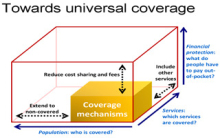UHC Leadership Programme

March 2017-December 2021
First program: March 2017, Second program: July 2017. Third program: November 2017, Fourth program: March 2018
Followed by three programs per year between 2018-2021
WHO Kobe Centre and Kanagawa Prefecture, Japan
Japan
Countries that have or will soon experience rapid population ageing have not fully understood the implications nor potential impact of the needs of population ageing on their health and social delivery systems. Planning for health systems strengthening towards UHC offers a major opportunity to transform systems and to appropriately plan for their future. Working across sectors and engaging communities are essential strategies, as is the need to ensure equity.
Given that countries are still at the early stage of addressing population ageing, this effort is a step to assist them develop trajectories (or roadmaps) for health system design, service delivery and financing in their contexts. The Leadership programme is helping to advance and accelerate their UHC agenda by supporting the country counterparts (as individuals and as country teams) with leadership training, coalition building support and results-oriented collective action initiatives. A key focus is to help define the “how to” for navigating and shaping the political economy in each country for the ageing and UHC agenda.
This UHC Leadership Programme is one of the opportunities to share evidence, data, information and case models for future policy options to the UHC leader in low and middle income countries. This programme is implemented in collaboration with Kanagawa Prefecture, Japan.
The objectives of the programs were to:
1. Share national/local decision making to lead, advocate, advance, design and implement reforms and programmes to transform health/social service delivery systems for ageing populations to attain UHC.
2. Share lessons and insights from Japan and among Asian countries for systems to respond to the needs of ageing population.
3. Share information and experience among countries to enable countries to develop initial trajectories (or roadmaps) for pursuing actions in their countries.
4. Provide lessons and examples from leading countries (e.g., Japan, Singapore) and from WHO synthesized knowledge for major components of health and social service systems design to support ageing populations: a) identifying a wide set of potential required services (coverage) b) models of delivery systems (and tailoring to each country needs); c) financing strategies d) health workforce implications e) use of technology and f) related enabling governance strategies.

